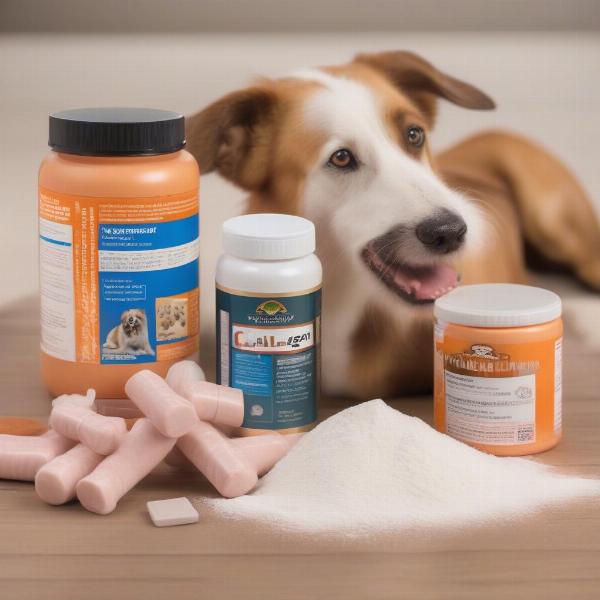Collagen supplements for dogs have become increasingly popular, promising benefits for joint health, skin and coat, and even digestion. But do they really work? This comprehensive guide will explore the science behind collagen, its potential benefits for dogs, and what to look for when choosing a supplement. We’ll delve into different types of collagen, dosage recommendations, and potential side effects, helping you make informed decisions about your dog’s health.
What is Collagen and Why is it Important for Dogs?
Collagen is the most abundant protein in a dog’s body, forming the connective tissues that support joints, cartilage, tendons, ligaments, skin, and even the gut lining. As dogs age, their natural collagen production slows down, which can contribute to joint stiffness, mobility issues, and skin problems. Supplementing with collagen may help replenish these diminishing levels and support overall health.
Types of Collagen Supplements for Dogs
Several types of collagen supplements are available, each with its own benefits and sources:
- Type I Collagen: The most common type, found in skin, tendons, and ligaments. It’s often sourced from bovine or marine sources.
- Type II Collagen: Primarily found in cartilage and is often recommended for joint support. Chicken cartilage is a common source.
- Type III Collagen: Often found alongside Type I, supporting skin elasticity and gut health.
- Hydrolyzed Collagen (Collagen Peptides): This form is broken down into smaller peptides for easier absorption by the body.
 Different types of collagen supplements for dogs
Different types of collagen supplements for dogs
Benefits of Collagen Supplements for Dogs
Are collagen chews safe for dogs? Yes, generally, provided they are from reputable sources and given in appropriate amounts. The potential benefits of collagen supplementation include:
- Improved Joint Health: Collagen can help support cartilage regeneration and reduce inflammation, potentially alleviating joint pain and improving mobility, especially in senior dogs or those with conditions like arthritis.
- Healthier Skin and Coat: Collagen contributes to skin elasticity and hydration, potentially leading to a shinier coat, reduced shedding, and faster wound healing.
- Enhanced Digestive Health: Collagen can help support the gut lining, potentially improving digestion and nutrient absorption.
Choosing the Right Collagen Supplement for Your Dog
When choosing a collagen supplement, consider the following:
- Source: Look for high-quality sources like grass-fed bovine or wild-caught marine collagen.
- Type: Choose the type of collagen that best suits your dog’s needs. Type II is often recommended for joint health, while Type I and III are good for skin and coat.
- Form: Collagen comes in various forms, including powders, chews, and liquids. Choose the form that’s easiest to administer to your dog.
- Dosage: Follow the manufacturer’s recommended dosage or consult your veterinarian.
How to Give Your Dog Collagen Supplements
Most collagen supplements can be easily mixed into your dog’s food or given as a treat. Start with a lower dose and gradually increase it to the recommended amount.
Potential Side Effects of Collagen Supplements
Collagen supplements are generally considered safe for dogs. However, some dogs may experience mild digestive upset, such as diarrhea or constipation. If you notice any adverse reactions, discontinue use and consult your veterinarian.
FAQ
- How long does it take to see results from collagen supplements? It can take several weeks or even months to see noticeable improvements.
- Can I give my puppy collagen supplements? Consult your vet first. Puppies are still growing and developing, so their collagen needs are different.
- Are there any dog breeds that benefit more from collagen? Larger breeds, breeds prone to joint issues, and senior dogs may benefit the most.
- Can I give my dog too much collagen? While generally safe, excessive amounts can cause digestive upset.
- What are other ways to support my dog’s collagen production? A balanced diet rich in protein and vitamin C can help support collagen synthesis.
- Can I give my dog human collagen supplements? It’s best to choose a supplement specifically formulated for dogs.
- Where can I buy collagen supplements for dogs? Reputable pet stores, online retailers, and veterinary clinics.
Related Articles
Conclusion
Collagen supplements can be a valuable addition to your dog’s health regimen, potentially supporting joint health, skin and coat, and digestion. By understanding the different types of collagen and choosing a high-quality supplement, you can help your furry friend enjoy a healthier, more active life. Remember to consult your veterinarian before starting any new supplement, especially if your dog has pre-existing health conditions.
ILM Dog is a leading international dog website dedicated to providing expert advice and resources on all aspects of dog care and well-being. From breed selection and puppy care to senior dog health and training tips, we strive to empower dog owners with the knowledge they need to provide their canine companions with the best possible care. We offer valuable insights on dog nutrition, behavior, grooming, and even travel tips for your adventures together. Contact us at [email protected] or call +44 20-3965-8624 for personalized guidance from our team of canine experts. Visit ILM Dog for more information and resources to help you and your dog live a happy and healthy life together.